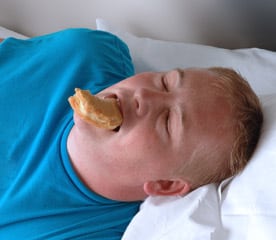 It’s February, how are you doing on your New Year’s resolutions? For some of us who have made resolutions of weight loss, success seems out of reach and our will power flailing. While nothing but your own determination and two feet will get you into the gym, the secret to improving your self-control in diet may lie in your sleep.
It’s February, how are you doing on your New Year’s resolutions? For some of us who have made resolutions of weight loss, success seems out of reach and our will power flailing. While nothing but your own determination and two feet will get you into the gym, the secret to improving your self-control in diet may lie in your sleep.
There is growing recognition that a large number of individuals living in Western society are chronically sleep deprived. Sleep deprivation is associated with an increase in food consumption and appetite. However, the brain regions that are most susceptible to sleep deprivation-induced changes when processing food stimuli have been unknown until recently.
New research out of Uppsala University in Sweden, published in The Journal of Clinical Endocrinology & Metabolism on January 18, 2012, examined brain activation after a night of regular sleep versus a night of sleep deprivation in response to images of food.
By means of functional magnetic resonance imaging (fMRI), the researchers studied the brains of 12 normal-weight males as they viewed images of food. The researchers compared the fMRI results between the two sessions each male subject underwent—looking at food images after a night with normal sleep versus looking at those same images after one night without sleep.
On the morning after either total sleep deprivation or sleep, neural activation was measured by fMRI, as the subjects viewed pictures of high- and low-calorie food items. Hunger ratings and morning fasting blood sugar, or glucose, levels were assessed before the scan, as well as in response to food images after the scan.
In both sleep-satisfied and sleep-deprived subjects, the same area of the brain—the right anterior cingulate cortex—was noted to have increased activation in response to the food images, independent of the images’ calorie content, or the subjects’ pre-scan hunger ratings. However, for the subjects in the total sleep deprivation state, the degree of activation on fMRI caused by visual food stimulus correlated positively with increased post-scan hunger ratings. This increase in self-reported hunger after viewing food images in the total sleep deprivation condition, versus the post-sleep condition, occurred despite no significant differences in the fasting blood glucose levels of the subjects.
Thus, acute sleep loss enhances the underlying drive to consume food, after processing the food image stimulus, independent of blood glucose levels. These findings highlight a potentially important mechanism contributing to the growing levels of obesity in Western society.
As the primary investigator of this study, Christian Benedict, explains:
“After a night of total sleep loss, these males showed a high level of activation in an area of the brain that is involved in a desire to eat. Bearing in mind that insufficient sleep is a growing problem in modern society, our results may explain why poor sleep habits can affect people’s risk to gain weight in the long run. It may therefore be important to sleep about eight hours every night to maintain a stable and healthy body weight.”
Learn more about our minimally invasive treatments for snoring and sleep apnea.

